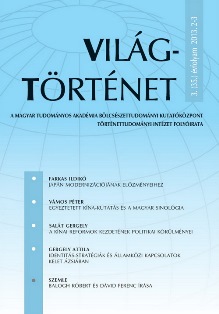„Következetes, kompromisszumok nélküli harcot folytatunk a maoizmus ellen.” Egyeztetett Kína-kutatás és a magyar sinológia
“We Are Waging a Consistent, Uncompromising Struggle Against Maoism.” Coordinated Research on Modern China and Hungarian Sinology
Author(s): Péter VámosSubject(s): History
Published by: Magyar Tudományos Akadémia Bölcsészettudományi Kutatóközpont Történettudományi Intézet
Summary/Abstract: In the 1970s, when Sino-Soviet relations were rather chilly, China-related research in Hungary was of a relatively high standard. A small group of scholars kept reading the Chinese press, monitored the official utterances of the Chinese leadership, and, regarding the Soviet model of socialism as the norm, formed a critical opinion about Beijing’s anti-Soviet policies. They translated those official Chinese publications that bore significance, and distributed them on a restricted basis. They also published analytical reports and situation assessments on Chinese domestic and foreign policies. This research activity was motivated, above all, by political considerations. While the initial impetus had been provided by the Soviets, the upgrading of Hungarian sinology was also facilitated by the fact that the leadership of the ruling Hungarian Socialist Workers’ Party (HSWP) fi rmly believed that Hungary was vitally interested in gaining an insight into the political developments in China. The critical tone of the Hungarian publications on China refl ected not only the scholars’ own convictions but also the intense political pressure exerted by the Soviet Union. Moscow wanted to secure the necessary support by fraternal parties, and to suppress the Chinese attempts which, in their opinion, aimed at destroying the unity of the socialist camp. The Soviet leaders were convinced that the Chinese turned their back not only to the Soviet Union, but also to the Soviet model of modernization. Soviet propaganda, which referred to the new achievements of scientific research as well, attempted to return the Chinese leadership to the “correct” way of building socialism. By the second half of the 1980s, however, it turned out that these attempts had failed and that the close coordination of China policies within the Soviet bloc lost its meaning and importance. This paper first gives an overview of the main characteristics of the relations between the Soviet bloc and China from the mid-1960s to the mid-1980s. By outlining China’s differentiating and differentiated policies toward the East-Central European Soviet satellites (Bulgaria, Czechoslovakia, GDR, Hungary, Poland) and the Soviet ambitions to control all spheres of their closest allies’ China-policies, the paper puts the development of Hungarian modern China-related research into context. Finally, it introduces the institutional framework of modern Chinese studies within the Soviet bloc and analyses the mechanism of its activities from its initiation in the early 1970s to its demise as a result of the improvement of relations between China and the Soviet bloc in the mid-1980s.
Journal: Világtörténet
- Issue Year: 2013
- Issue No: 2-3
- Page Range: 227-257
- Page Count: 31
- Language: Hungarian

